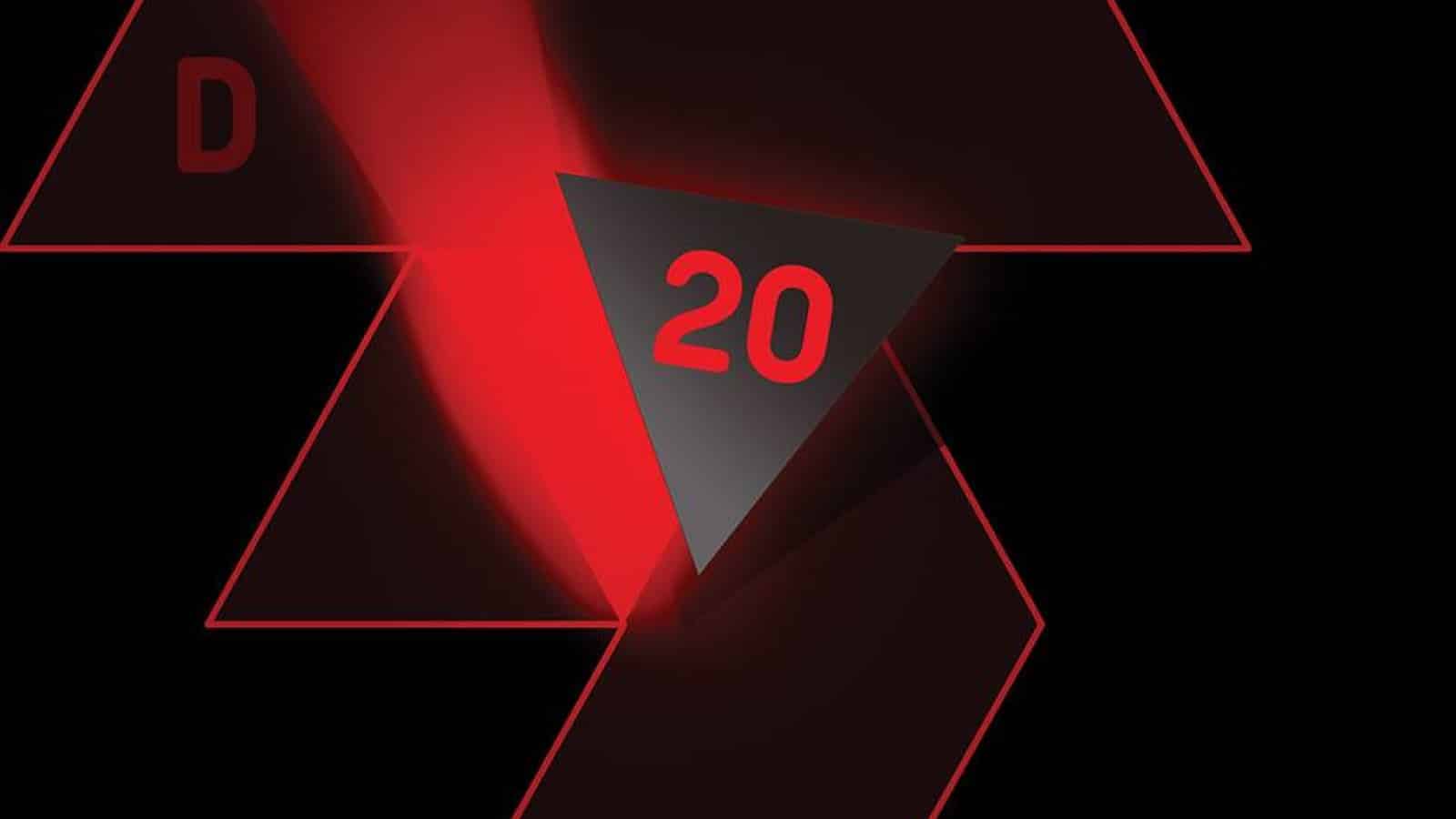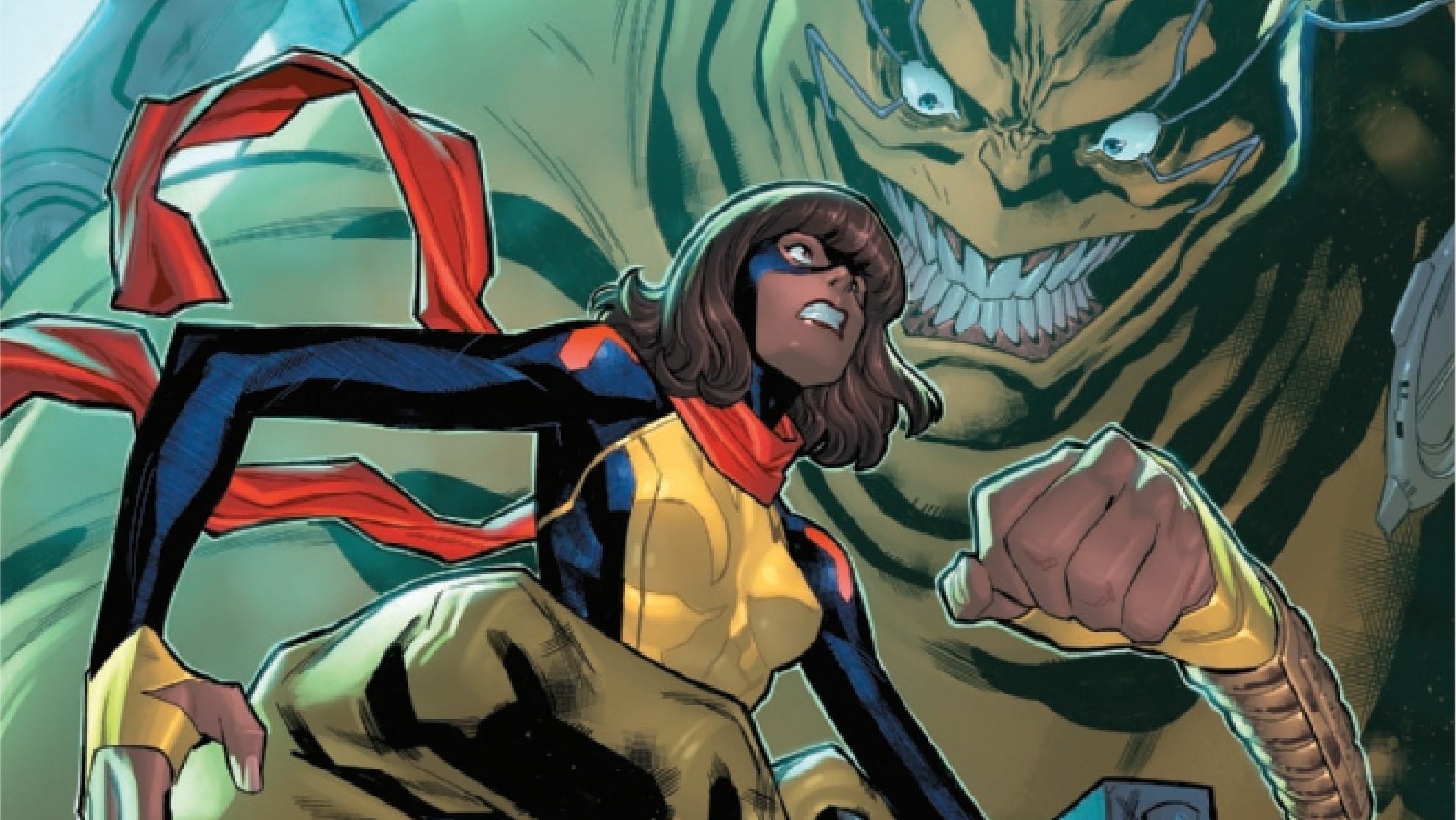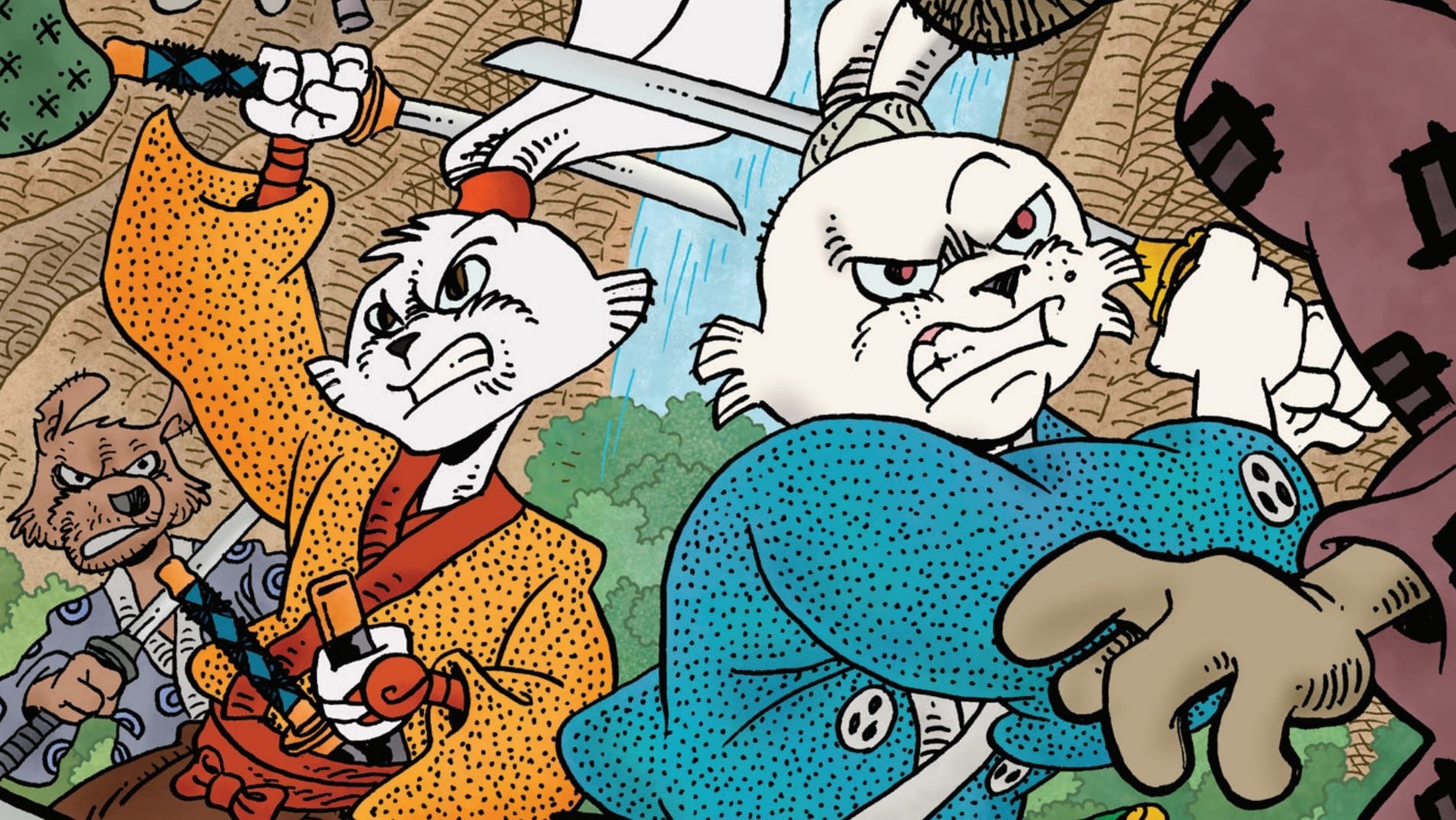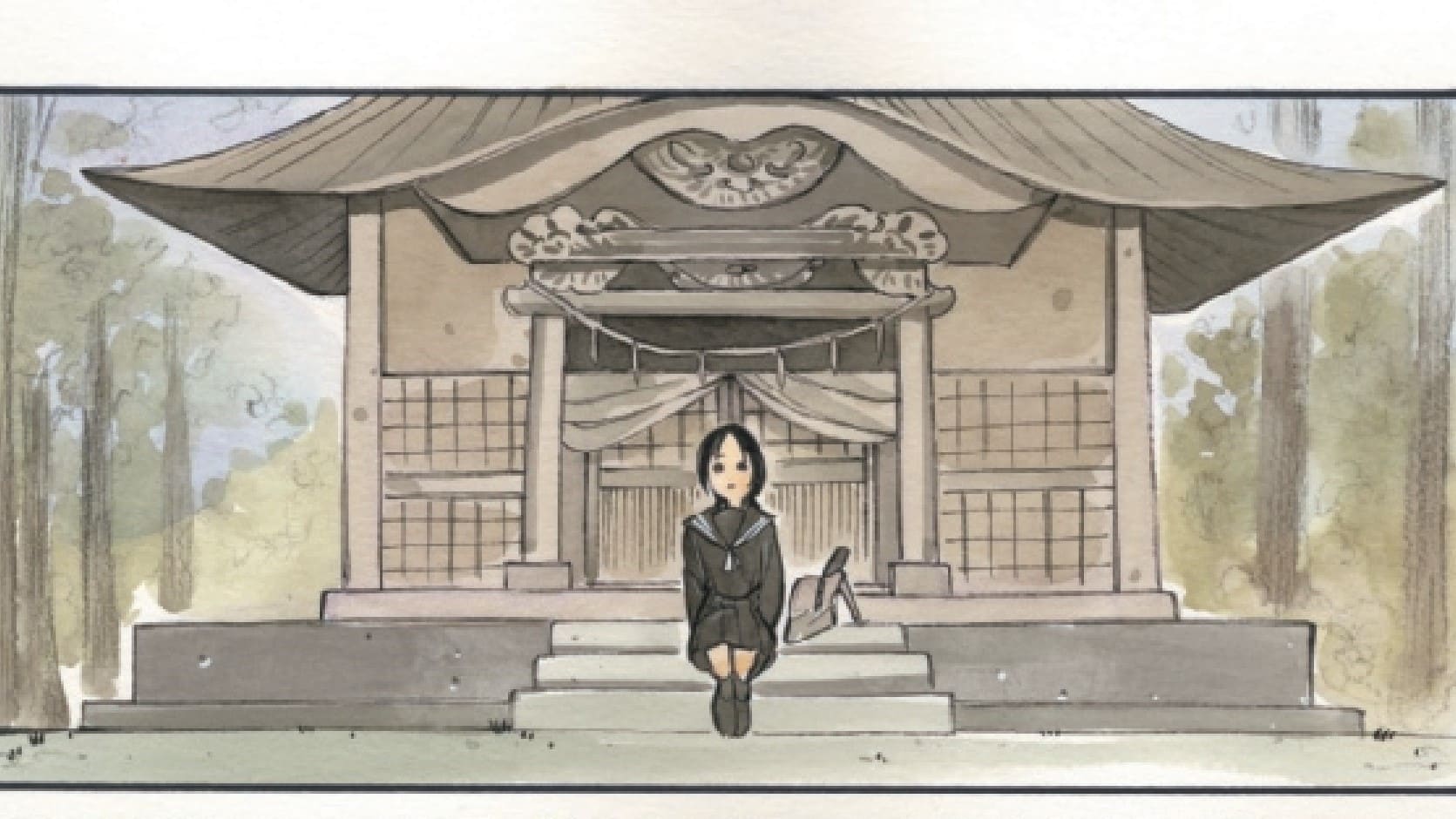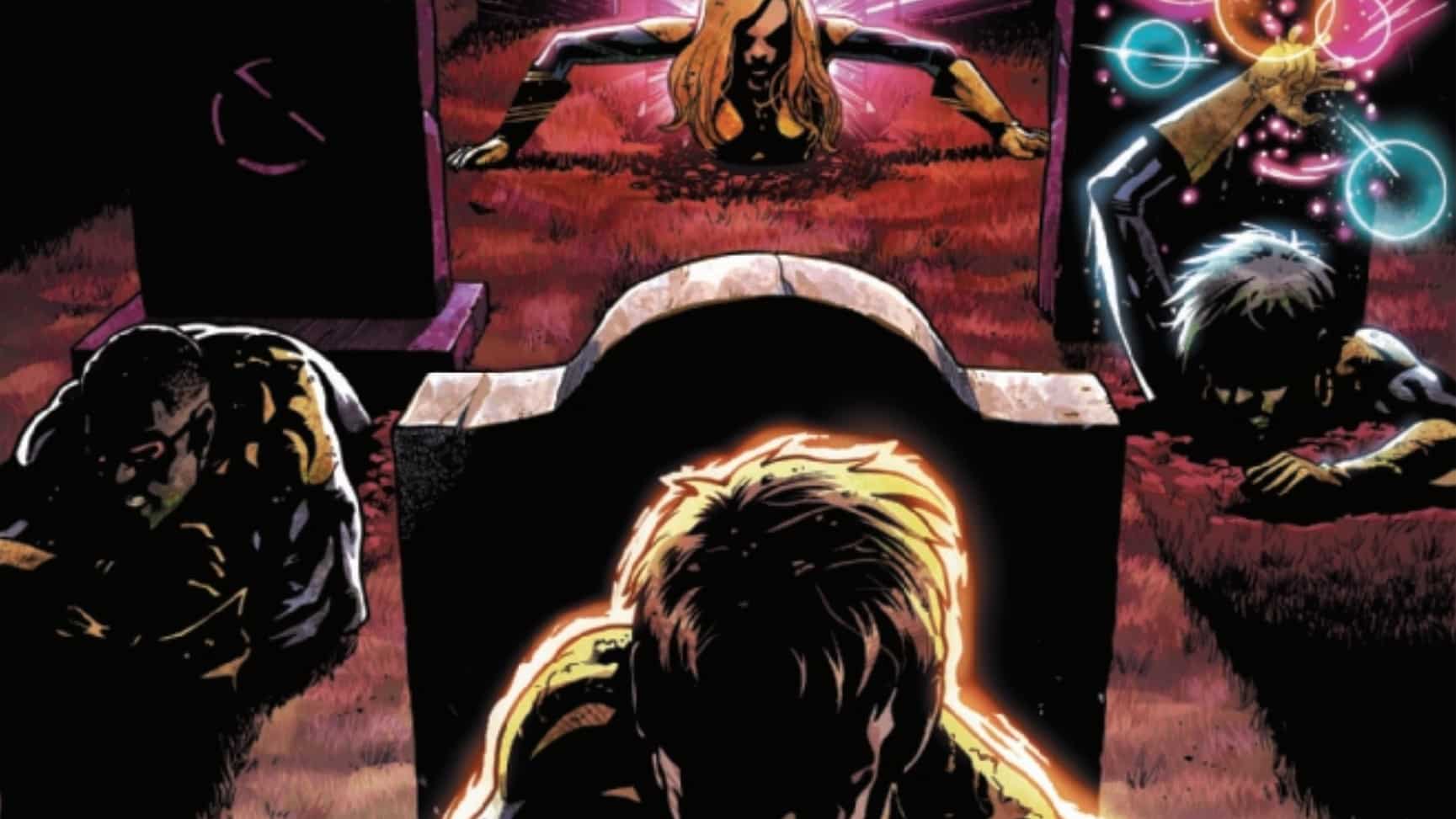You can never go home, said Sol, way back in issue #2. Let’s see if he was right in DIE #20, written by Kieron Gillen, drawn by Stephanie Hans and lettered by Clayton Cowles for Image Comics.
Mark Turetsky: Ahoy, weary traveler! We meet again in this hallowed space, to convene our council one final time!
Corey Smith: It’s taken 20 issues, three years, a (continuing) pandemic and far more tissues than I’d care to admit, but here we are, at the end. Are you ready?
Mark: I’ve gone back and reread every issue, listened to every interview and even listened to Gillen’s (and friends’) podcast about the D&D episode of Community, so I think I’m as ready as I’ll ever be!
Corey: Brilliant! I, of course, am planning to end up a weeping mess on the floor, and if I own up to that now, it’ll seem clever when it comes to pass. How’s that for a time loop?
A Long-Expected Party

Mark: Speaking of! The final issue begins with our last flashback to 1991, the day of the infamous birthday party that ended up with everybody sent to the world of DIE. We finally get to see where Sol got the magic dice from. It’s a mysterious package sent by an anonymous benefactor (malefactor!), which inspires him to create DIE as a birthday gift for Dominic. Then we jump ahead to the story’s present, and we discover that it is, in fact, already 2020 (you’ll recall that each plot summary begins with “as 2020 looms,” and this is the first time in a long time that a caption has given us the year in the present). So there’s a subtle hint that they may already be too late.
Corey: Now, Mark. Even I know that a party is never late, nor are they early. They arrive precisely when the omnipotent manifestation of a magical board game means them to.
But, real talk, the slow passage of time throughout the story has always been a neat touch. I’m not sure if the original plan was for the comic to end last year, before, well, last year. But I think of every tragedy this comic has seen, our cast — or most of them — coming back to Earth in the middle of 2020 might be one of the most gut-wrenching. Haven’t these people been through enough?
Mark: Let’s see. The comic started in December 2018, so it would be theoretically possible to put out 20 issues in the 25 or so months between then and the end of 2020, but practically speaking, that would have been an awful lot to ask of one artist. That’s especially true when each issue is 25 pages, rather than the traditional 20, making it more like 24 issues in that time frame.
But before they get to come back to reality, they’ve got to face The Grandmaster. The Big Bad. The embodiment of an evil tabletop role playing game that has caused world wars, consumed the lives of one of the preëminent families of English literature. The monster at the end of this book. Or is it?
Corey: Last month, we were wondering what sort of form this final confrontation would take, and while I’m confident this team could have made a giant battle work, I’m glad that it didn’t. To a large extent, I feel a physical fight would have been an anticlimax, because at the end of the day, DIE has never been about that. The running thread through each of the character classes (with the possible exception of the Fool, but that’s easily argued), isn’t combat, it’s communication, so a final encounter that asks a question? I genuinely can’t think of a better way for it to end.
Mark: It’s funny you mention The Fool as being combat-focused, because Chuck very much tries to totally smashify The Grandmaster, forcing Ash to use The Voice on him to get him to stop. Matt even lampshades that he had to know that’s what would happen. So the question in my mind is this: Does Chuck do this because he knows Ash would release Sol by using her Voice on him, leaving himself open to become the sacrifice that they need to get home? I’d argue that Chuck knows what his role is better than just about anyone, as he’s the fantasy novelist, and leans in more than anyone else in the party. He’s been making “dead man walking” jokes this whole time, and it’s been thoroughly foreshadowed, so it’s almost certain that he knew he’d be the one Sol would chomp down on, at least in my mind.
Corey: I think you’re absolutely right — even if he didn’t go into it expecting to sacrifice himself, when he saw the opportunity, he went for it. He’s consistently shown an almost ruthless pragmatism, and it reads true to form for that pragmatism to be focused on the overall good of the group, even before his own self-interest. I’m sure it doesn’t hurt that he knew sacrificing himself for Sol would still keep him in the picture, more or less — after all, we know that Fallen who are freshly dead retain a lot of their personality. Chuck lived and died a bastard, but that doesn’t necessarily mean he was a bad person.
Mark: And so, with Chuck now dead and Sol brought back to life, it’s time to answer The Grandmaster’s “What am I for?” This moment was foreshadowed in issue #14, when Molly picks up on a signal broadcasting that question when the dice are being forged in Glasstown. But before Sol can answer the question, Sol demands The Grandmaster explain the backstory.
It’s nice to have it all spelled out plainly here, but for the most part it’s reiterating and reinforcing stuff that’s been outright stated or strongly implied over the course of the series. Of course, had I not recently reread the whole thing, this sort of restatement would have been much more helpful, I’m sure. And with a monthly comic that’s been running for years (and let’s face it, a global pandemic can do bad things to one’s memory), it’s likely to be a welcome segment. It reminded me a lot of the pure exposition of The Architect’s scene in The Matrix Reloaded. What’d you think of this scene, Corey?
Master and Grandmaster

Corey: I honestly found it very useful — I had planned to reread the series this month, but unfortunately my schedule didn’t allow me to. As it stood, very welcome! It definitely helps that Gillen is very adept at delivering exposition in a way that doesn’t break immersion — it’s an important skill for a GM to cultivate, precisely for these final bouts, and it absolutely shines through here. As helpful as it could be for the audience, it serves an interesting in-universe purpose as well, giving the players one last chance to go over their notes before answering the question: What is DIE for? It has, after all, been about as long for them as it has for us, and lord knows a refresher would be useful in their shoes. Our party has had a lot on their plate.
Mark: And it also recontextualizes a key scene from issue #18, the big Sol issue. Go back and read the scene where The Grandmaster catches Sol in the dungeon, but this time, read it as The Grandmaster seeking commands from its creator. When The Grandmaster asks Sol, “What do you do now?” it’s literally seeking a prompt. Sol responds, “It doesn’t matter what I do. You’ve got the control here […] The others left me. They need to know.” When you read it the first time, thinking Sol is the victim of the game, it reads a certain way, but now knowing that he’s unwittingly programming it, and dooming his friends and the world, it becomes, more properly, Tragic. The Grandmaster then tells Sol he’ll have all of the Grandmaster’s power, and Sol tells it, “You can’t just do that […] There must be a cost.” Sol clearly thinks he’s staying a step ahead of The Grandmaster, but he’s really just screwing himself. And doing it so utterly. It’s why he loses his eyes (a callback to classical tragedy there, from Oedipus Rex to King Lear).
And all this talk of “The end of time;” the players (and we, to be honest) should have realized that “the end of time” has a very specific meaning in the context of a game. It just means that the players, the game, are out of time. The game clock has run out.
Another thing I noticed here that I missed in The Grandmaster’s appearances in #18 and #19 is that The Grandmaster’s lettering is the same as the font used for the title page and for the location captions. Very meta! Well done, Clayton Cowles!
Corey: I’m continually blown away by the subtle lettering choices Cowles has made throughout this series. I’ve seen people say that the mark of a good letterer is that you barely notice they’re there, but if DIE has taught me anything, it’s that good lettering will hit you when you’re unprepared, and leave you floored by its cleverness. And on the subject of cleverness, you’re absolutely right that Sol’s thoughtfulness has done more harm than help. I think every party throughout history has had a player who’s too damn clever for their own good, and the fact that this time it’s Sol, not just the player but the functional GM, is a brilliant twist of the knife. There’s a lot of room for argument, in a tale of predestination and paradox, for how much of the blame can be placed at Sol’s feet. From a narrative standpoint, it obviously wouldn’t have worked without that cynicism on his part, and from an in-universe perspective, it was necessary for the loop to play out the way it did, but if I were him, I don’t think I’d be able to avoid wondering if the game’s ultimate lesson wasn’t something along the lines of “stop being a cynic.”
Mark: It might well be one of Gillen’s lessons in this comic. He’s said in many interviews and essays that a lot of his work tends to have the goal of teaching his readers to be more critical of the work they engage with.
So we get Ash, our narrator throughout this whole ordeal, explaining what each of the players got from the game, and dismissing The Grandmaster once and for all. And of course, The Grandmaster vanishes while saying “Thank you for playing,” which is just … it’s almost the most awful thing it could say right in that moment (Maybe a close second would be The Secret of Monkey Island’s “Turn off your computer and go to sleep”).
Sol sends his dice to himself in 1991, and we get a little coda between the newly Fallen Chuck, Molly and Case. It’s almost touching; they form a little adventuring party here at the end. And with Chuck killing himself for fair gold to keep Case around (with a mechanical OMNOMNOM), you have to wonder if he’s turning over a new leaf in his undeath. Don’t forget, just last month, he killed Molly for a piece of fair gold, but here he takes the hit himself. Has he demonstrated, *gasp* growth? And add to that when the Elf Queen shows up to give them a quest, he asks her name, something he was decidedly uninterested in knowing way back in issue #7. In his life, he was utterly disinterested in his own children, and in DIE considered Molly to be nothing more than a hindrance, but he seems to be showing some genuine parental regard for her here at the end.
Corey: It’s a truly fantastic bit of growth, especially considering what we saw of Chuck’s relationship with Angela. It’s telling that his “last words” were regret that he hadn’t been better, and his first actions as a Fallen show a genuine attempt at follow-through. I’m genuinely not sure where Chuck’s new postgame party (afterparty?) will go from here, but whatever it is, I’m sure it’d make for a hell of a story. (I’d also like to take this moment to be completely on brand, and point out that the “Thank you for playing” ending was used to similar effect in the original conclusion to Homestuck, and that realization left me seriously in need of a higher BAC.)
The fact that Molly’s story doesn’t get much of a resolution, or even, for the most part, interact with our main cast’s, is as heartbreaking as it is fascinating, by the way. We still aren’t clear on how or why she ends up in DIE as a player to begin with, beyond it needing to happen, and Angela having to live with that knowledge is probably one of the most emotionally fucked up things in the series. For most of the others, the game is over, a thing of the past, but for Angela, possibly the character who was already the most traumatized by their first foray into DIE, there’s always going to be the lingering question of exactly how much time she has until it takes her daughter from her, too.
The Scouring of Stafford

Mark: And now it’s time for our characters to have their happy ending. They’ve finally defeated/lost to DIE, they’ve returned to England’s Midlands, and now they’re ready to reunite with their families. Of course, we the readers know that the world of 2020 is horrifically different from the world of 2018 that they left. It’s reminiscent of the last few chapters of The Return of the King. I alluded in last month’s review to an event called The Scouring of the Shire. It’s not in the movies, and it’s a shame that it isn’t, because it’s vital to the story. Anyway, the hobbits who’ve been off adventuring, saving the world, come home to The Shire and find that it’s been taken over by Saruman. Their friends are imprisoned, there are half-orcs enforcing a new industrial way of life. The hobbits are able to drive them away, but their home is irrevocably changed. It mirrors Tolkien’s return from World War I, finding many of his friends had died, and that the rural way of life he grew up with was vanishing. I don’t want to get too deep into it, but I think it borders on immorality to just have the hobbits return to this untouched Eden, separate from the world. It’s a happier ending, but it’s not an honest one. Anyway.
Sol tells them in issue #2, “You can never go home,” and it’s played as dark humor, but now that they’ve returned to the Midlands, they find the truth to the adage. Not only are they plunged into the middle of the COVID-19 pandemic, where the expectations for congregating in groups and shopping in stores have suddenly changed, but they have to deal with the fallout of their having gone missing for two or so years. But it’s not all bad. It turns out The Mourner lied to Isabelle about Matt’s father, and he’s very much alive. The Mourner is a liar, and, it turns out, is mostly interested in stirring shit up.
Corey: That was an unexpected bright spot! Matt’s knowledge of his lost parent was one of the more interesting prices we’ve seen our cast pay, so the fact that it turned out to be a lie caught me by surprise. It’s either serious cruelty or kindness on her part, and arguably, the part of DIE as a whole. Either way, while no character strictly deserves a happier ending than the others, it’s a relief that things worked out for him about as well as they could have. Matt spent a lot of time working his ass off to keep the others holding themselves to a high standard, and it’s nice to see some small measure of reward. Not all of our cast is quite so lucky. Izzy, for example, came back to a house that was no longer her own, having learned perhaps the most valuable lesson of any of our heroes: The bank doesn’t give a shit about your trauma, they just want their damn money.
Mark: Yeah, Izzy held herself to just as high a standard, even saving the population of Angria from getting slaughtered by Matt. It’s somehow fitting that a character whose powers in-game are based on trading debts ends up getting her house repossessed.
Angela comes home and sees a still-human Molly, but who now hates her for abandoning them. If you read the scene with “Neo” as a stand-in for “addict,” it clicks into place with a lot more meaning. Sol gets reunited with his mom, which is a nice ending for her, especially when you compare her to the utterly broken person she was in issue #1.
Dominic/Ash returns home to Sophie, who has a surprise waiting at home: They’ve become parents. Issue #10 contains a scene where Dominic and Sophie are trying to conceive through IVF, and they get a negative result on an at-home pregnancy test. But I guess it turns out that it was an early false negative. It’s interesting to see Dominic/Ash getting a chance to be a parent at long last, since they missed out on Augustus’ childhood entirely (and Augustus has vowed to kill them if they ever return to Angria, so … not a great relationship there). It’s something of a happy ending for Dominic/Ash.
Corey: Honestly, between another chance at parenthood and that whole self-actualization schtick, things definitely could have gone worse for Ash. I’d also like to point out, because I’ve seen a lot of theorizing since the last issue, that the lack of a typical combat leaves it unclear if her post-Balrog palette swap seems to be more symbolic (and Gandalf-y) than it is evidence of any change in power. So, with everyone accounted for and ready to move on to the rest of their lives, we close on Sol, with one hell of a doozy — my boy still has a glowing D20 in his eye socket.
I’m not ashamed to admit that I fully lost the ability of coherent speech at that point. What a panel to end on! Assuming we won’t get a canonical answer, I’ve gotta wonder: What do you think it all means?
Mark: We know the die that’s in Sol’s left socket is the D20 he got on his birthday in 1991. However, there’s a subtle art thing that I noticed in this final issue. Right after The Grandmaster says, “Thank you for playing,” the next panel shows all six of the magic dice. On the next page, we see Sol kneeling down in front of only five of them, and we see the D20 in his hand. Then in the next few panels he sends the box of dice back to 1991. Did he somehow break the cycle and not send back the D20? Did he instead pocket it, knowing his D20 would stay behind, like everyone else’s dice? And if he did so, and he smuggled the D20 back to 2020, does that mean The Grandmaster has yet to manifest? That the party we’ve been following aren’t the first six, and it’s still out there waiting to materialize in your next tabletop roleplaying game?
And that final page … by my count, this is now the third Kieron Gillen comic to end with a character directly addressing the reader on the final page. He did it in Journey Into Mystery #645 (with Stephanie Hans!), and he did it in The Wicked + The Divine. They both had different vibes, with Kid Loki (seemingly) castigating the reader for sitting by and doing nothing and Laura giving out some very good advice about looking at art with a critical eye. This one is the most threatening of the three, inviting us to get lost in Sol’s fantasy world. It works, it’s genuinely creepy, but it’s a technique I hope Gillen leaves behind after this one, lest it become played out.
Corey: Good catch with him picking up the die, I had totally missed that! I get where you’re coming from in regard to addressing the reader, but it honestly didn’t faze me too much — after all, the narration has always been addressing the reader. No, what struck me the most in that segment is that with the final words in the series, in the middle of a sentence, Sol has taken Ash’s place as the one addressing us. Even without the d-eye reveal, that would have had me reassessing what I thought to be true, in and of itself.
Mark: It’s a truly creepy ending, that’s for sure.
Random Throws of the DIE
- With Gillen saying he’s deliberately left open the possibility of telling other stories in the world of DIE, I’m excited to see what form those might take. There’s a lot of that planetary D20 left to explore.
- I’m personally hoping for DIE: Fantasy High edition.
- Mark here. I just want to say that it’s been a pleasure writing about this comic with you, Corey!
- Back at ya! It’s been an absolute blast! Working with someone who actually gets all of the Tolkien references has definitely helped my understanding of the comic.
- But also, dear readers, keep your eyes on this space for one last DIE thing!

